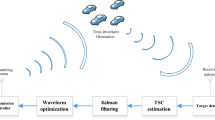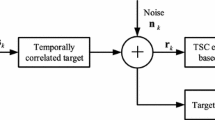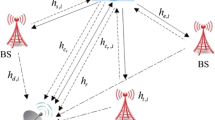Abstract
The problem of robust transmitted waveform and received filter design for cognitive radar in a signal-dependent interference environment is considered. When estimate errors of the target impulse response (TIR) and clutter impulse response (CIR) exist, in order to improve the worst signal-to-clutter ratio (SCR) and signal-to-interference-and-noise ratio (SINR), a robust transmitted waveform and received filter are designed based on the minimax criterion by using the information fed back from the receiver. Using deterministic and random models, the waveform and filter design problem is divided into three optimization problems. The robust waveform and filter are then obtained by solving these problems. In the deterministic model, we prove that the robust waveform and filter impulse response can be generated by a pseudorandom code. In the random model, the robust waveform and filter impulse response can be obtained by an alternative projection algorithm. Numerical results indicate that the worst SINR of the robust waveform and filter is higher than that of the traditional waveform and filter.









Similar content being viewed by others
References
C.K. Ahn, W.H. Kwon, H ∞ FIR filters for linear continuous-time state–space systems. IEEE Signal Process. Lett. 13(9), 557–560 (2006)
C.K. Ahn, S. Han, W.H. Kwon, H ∞ finite memory controls for linear discrete-time state–space models. IEEE Trans. Circuits Syst. II, Express Briefs 54(2), 97–101 (2007)
C.K. Ahn, Robustness bound for receding horizon finite memory control: Lyapunov–Krasovskii approach. Int. J. Control 85(7), 942–949 (2012)
C.K. Ahn, Strictly passive FIR filtering for state-space models with external disturbance. AEÜ, Int. J. Electron. Commun. 66(11), 944–948 (2012)
C.K. Ahn, P.S. Kin, Fixed-lag maximum likelihood FIR smoother for state-space models. IEICE Electron. Express 5(1), 11–16 (2008)
A. Aubry, A. DeMaio, M. Piezzo et al., Cognitive design of the receive filter and transmitted phase code in reverberating environment. IET Radar Sonar Navig. 6(9), 822–833 (2012)
A. Aubry, A. DeMaio, A. Farina et al., Knowledge-aided (potentially cognitive) transmit signal and receive filter design in signal-dependent clutter. IEEE Trans. Aerosp. Electron. Syst. 49(1), 93–117 (2013)
M.R. Bell, Information theory and radar waveform design. IEEE Trans. Inf. Theory 39(5), 1578–1597 (1993)
C.Y. Chen, P.P. Vaidyanathan, MIMO radar waveform optimization with prior information of the extended target and clutter. IEEE Trans. Signal Process. 57(9), 3533–3544 (2009)
B. Dumitrescu, Bounded real lemma for FIR MIMO systems. IEEE Signal Process. Lett. 12(7), 496–499 (2005)
E. Grossi, M. Lops, L. Venturino, Robust waveform design for MIMO radars. IEEE Trans. Signal Process. 59(7), 3262–3271 (2011)
J.R. Guerci, S.U. Pillai, Theory and application of optimum transmit-receive radar, in The Record of the IEEE 2000 International Radar Conference (2000), pp. 705–710
J.R. Guerci, Cognitive radar: the knowledge-aided fully adaptive approach, in 2010 IEEE Radar Conference (2010), pp. 1365–1370
S. Haykin, Cognitive radar: a way of the future. IEEE Signal Process. Mag. 23(1), 30–40 (2006)
B. Jiu, H. Liu, D. Feng et al., Minimax robust transmission waveform and receiving filter design for extended target detection with imprecise prior knowledge. Signal Process. 92(1), 210–218 (2012)
A. Leshem, O. Naparstek, A. Nehorai, Information theoretic adaptive radar waveform design for multiple extended targets. IEEE J. Sel. Top. Signal Process. 1(1), 42–55 (2007)
A.W. Marshall, I. Olkin, B.C. Arnold, Inequalities: Theory of Majorization and Its Applications (Academic Press, New York, 1979), pp. 338–339
S.U. Pillai, H.S. Oh, D.C. Youla et al., Optimal transmit-receiver design in the presence of signal-dependent interference and channel noise. IEEE Trans. Inf. Theory 46(2), 577–584 (2000)
R.A. Romero, N.A. Goodman, Waveform design in signal-dependent interference and application to target recognition with multiple transmissions. IET Radar Sonar Navig. 3(4), 328–340 (2009)
P. Stoica, J. Li, M. Xue, Transmit codes and receive filters for radar. IEEE Signal Process. Mag. 25(6), 94–109 (2008)
P. Stoica, H. He, J. Li, Optimization of the receive filter and transmit sequence for active sensing. IEEE Trans. Signal Process. 60(4), 1730–1740 (2012)
P. Stoica, J. Li, Y. Xie, On probing signal design for MIMO radar. IEEE Trans. Signal Process. 55(8), 4151–4161 (2007)
T.J. Su, H.W. Peng, Robust finite impulse response equalisation for time-delay communication channels: linear matrix inequality approach. IET Control Theory Appl. 1(1), 226–232 (2007)
B. Tang, J. Tang, Y.N. Peng, MIMO radar waveform design in colored noise based on information theory. IEEE Trans. Signal Process. 58(9), 4684–4697 (2010)
S.J. Wang, M.X. Wu, Z.Z. Jia, Matrix Inequalities, 2nd edn. (Science Press, Beijing, 2006), pp. 127–129
Y. Yang, R.S. Blum, MIMO radar waveform design based on mutual information and minimum mean-square error estimation. IEEE Trans. Aerosp. Electron. Syst. 43(1), 330–343 (2007)
Y. Yang, R.S. Blum, Minimax robust MIMO radar waveform design. IEEE J. Sel. Top. Signal Process. 1(1), 147–155 (2007)
H. Zhang, Y. Shi, A. Saadat Mehr, On H ∞ filtering for discrete-time Takagi–Sugeno fuzzy systems. IEEE Trans. Fuzzy Syst. 20(2), 396–401 (2012)
H. Zhang, Y. Shi, A. Saadat Mehr, Robust weighted \(\mathcal{H}_{\infty}\) filtering for networked systems with intermitted measurements of multiple sensors. Int. J. Adapt. Control Signal Process. 25(4), 313–330 (2011)
H. Zhang, Y. Shi, A. Saadat Mehr, Robust energy-to-peak filtering for networked systems with time-varying delays and randomly missing data. IET Control Theory Appl. 4(12), 2921–2936 (2010)
H. Zhang, Y. Shi, A. Saadat Mehr, Robust energy-to-peak FIR equalization for time-varying communication channels with intermittent observations. Signal Process. 91(7), 1651–1658 (2011)
H. Zhang, A. Saadat Mehr, Y. Shi, Improved robust energy-to-peak filtering for uncertain linear systems. Signal Process. 90(9), 2667–2675 (2010)
H. Zhang, A. Saadat Mehr, Y. Shi, Robust non-fragile dynamic vibration absorbers with uncertain factors. J. Sound Vib. 330(4), 559–566 (2011)
H. Zhang, Y. Shi, A. Saadat Mehr, Robust equalisation for inter symbol interference communication channels. IET Signal Process. 6(2), 73–78 (2012)
Author information
Authors and Affiliations
Corresponding author
Rights and permissions
About this article
Cite this article
Zhang, X., Cui, C. Robust Transmitted Waveform and Received Filter Design for Cognitive Radar in the Presence of Signal-Dependent Interference. Circuits Syst Signal Process 32, 3013–3029 (2013). https://doi.org/10.1007/s00034-013-9611-6
Received:
Revised:
Published:
Issue Date:
DOI: https://doi.org/10.1007/s00034-013-9611-6




